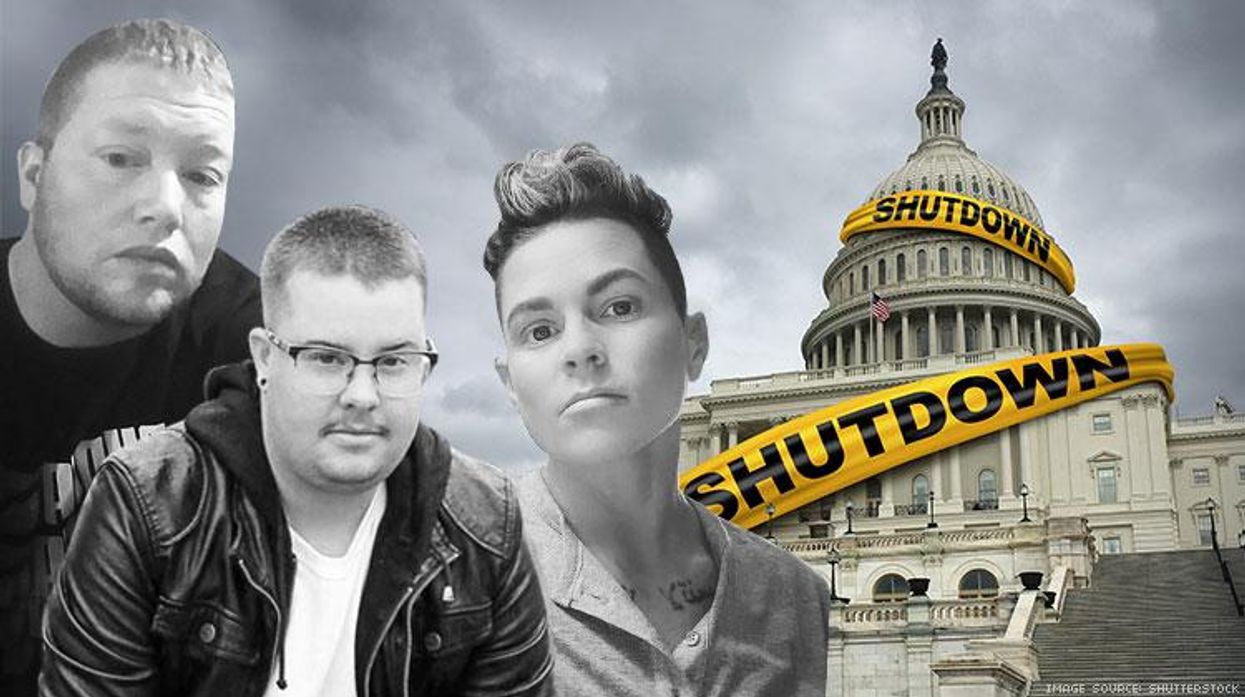Politics
Amid the Shutdown, LGBTQ Workers in Oklahoma Face a Special Suffering

Queer federal workers in the Bible Belt encounter both discrimination and a dearth of opportunities.
January 24 2019 4:52 PM EST
By continuing to use our site, you agree to our Privacy Policy and Terms of Use.

Queer federal workers in the Bible Belt encounter both discrimination and a dearth of opportunities.
Oklahoma is the heart of flyover country and rarely registers in many American minds outside of sports, political scandals, or a campy musical. However, due to a vibrant arts and music scene, Native American heritage, and a diverse natural landscape that varies from Southern forest to mountains to western prairies, there remains a stubborn pride among its residents.
The Sooner State is also home to over 100,000 government employees and contractors, as well an LGBTQ Pride festival in Oklahoma City that draws almost that many. And as the partial government shutdown continues with no clear end in sight, its impact can be felt acutely here -- especially for those federal workers who identify as queer, a group that experiences high rates of employment and hiring discrimination.
Kayde Waldon, a transgender man, works at the Federal Aviation Administration's Mike Monroney Aeronautical Center in Oklahoma City. He is one of the 1,725 workers and contracters in limbo there ever since President Trump shut the government down after Democrats refused to fund his proposed border wall with Mexico.
For the past year, Waldon has worked for the FAA Air Traffic Controller Academy as a contracted remote pilot operator, better known as a drone operator. The Oklahoma native was able to parlay that into a new position based in Washington D.C., where he would begin teaching new technology to air traffic controllers across the country.
Days before he was about to start his new job this month, the government shutdown began and he found himself caught in a bureaucratic loophole. Due to his new position also being furloughed, he was never able to officially start the position. And now in the eyes of state unemployment agencies, it appears to them that he left his previous job without employment lined up.
"They perceived this as me leaving my government contract willingly for another one a week later," Waldon tells The Advocate, "therefore, unable to qualify for benefits."
As he waits for resolution regarding the status of his new job -- and whether it will still be available to him after the shutdown -- he and his fiance are both looking for second sources of income. Both are having a difficult time finding work because employers are uncertain they'll stay after the government reopens.
Waldon's partner has taken on a role as a substitute teacher to help them skirt by. Waldon is looking for work and also trying to help others affected by the shutdown.
"I reached out to local Starbucks baristas who would be willing to donate to our OKC Air Traffic Controllers," he says, referring to colleagues still working, but without pay -- employees the government deemed "essential" -- and says he's been able to get over 20 pounds of coffee donated as well as "lots and lots of snacks."
The donations are helpful, but they don't pay the rent, especially as the government shutdown enters the second pay-cycle.
Above: Waldon
Leah Barnard -- a guard at a medium security all-male prison in El Reno -- is one of those workers forced to report to work without pay. She has a commute of almost an hour from her home in the city of Moore, where she's been the primary income provider for her wife and two children. She says that the worries about providing for her family and bills "has made a job that is already very dangerous more dangerous because I can no longer concentrate."
Barnard says that the stress of working the job without pay has made this one of the lowest points in her life and is impacting all aspects of it; she recently had to have the $5 entry fees for her children's basketball games waived just to attend.
"I pride myself in taking care of my family and I am no longer able to do that," Barnard tells The Advocate. Her wife, employed as a hairstylist, has had to work overtime to make up the difference in their family income. But it's not working. As the shutdown ripples through their town, her salon chairs grow increasingly empty.
Barnard's co-worker at the prison, Aydian Jones, is the only transgender person working there and also shows up everyday for no pay. During his time working there as a guard, he has historically focused on improving coworkers understanding of transgender issues as well as the treatment of inmates being held there. It strikes Jones as ironic that he works so hard all while his personal finances -- and well-being -- suffer.
Jones says that working without pay and benefits is directly impacting his own access to adequate health care. His own vision and dental health care has evaporated until his next paycheck comes unless he pays the premiums on the plan, which he cannot afford.
LGBTQ people like Jones, Barnard, and Waldon can do nothing but wait and wonder when relief will come. And even with no pay and healthcare, many of these people remain resolute in returning to work soon, especially since their federal jobs are some of the only positions in the area that pay a living wage.
"I'm in it for the long run," Jones says.
Charlie Kirk DID say stoning gay people was the 'perfect law' — and these other heinous quotes